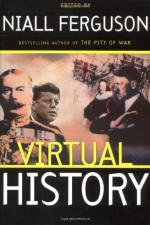|
This section contains 850 words (approx. 3 pages at 300 words per page) |

|
SOURCE: “Avoiding Hitler,” in The Economist, November 14, 1998, p. 5.
In the following review, the critic discusses Ferguson's historical argument in The Pity of War.
For Europe at least, the first world war was by many accounts the defining event of this century. But the very magnitude of the catastrophe it represented for liberal civilisation has tended to paralyse historical imagination, fixing the study of it in patriotic apology or moral lament—still two of the dominant modes of writing about the Great War. At one massive stroke, Niall Ferguson has transformed this dismal intellectual landscape, a kind of Flanders of the mind. The Pity of War for the first time brings the carnage of 1914–18 into sharp, unmystified focus. This is analytical history at its mordant best. Rather than offering yet another narrative, Mr. Ferguson poses a series of stark questions about the conflict. Why did hostilities break out? Were...
|
This section contains 850 words (approx. 3 pages at 300 words per page) |

|


